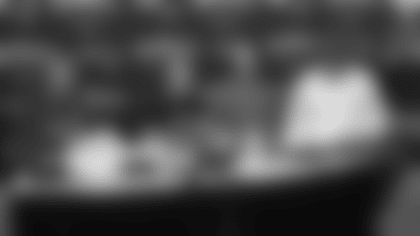[

]()
**Q: There has been a lot of buzz about the way you're playing, your size, is this something you've dealt with through your entire career? You've always been the biggest kid on the block and certainly the biggest quarterback in the league?**
C: You know in a sense I have, but for the most part I really don't worry about it. I just go out and focus on my job and try to get that done.
Q: Is it a great asset to have that size and still be able to run and throw the ball?
C: Oh yeah, it's good. We definitely try to use it to our advantage and just try to exploit defenses any way we can.
Q: You know you are a young quarterback coming into a situation were you've got a veteran running back and one of the best wide receiver combinations in the league, not a bad supporting cast...
C: Oh, not at all. I'm very thankful and pleased to be able to play with guys of that caliber and hopefully we can just use them to our advantage.
Q: When you were a kid did anybody try and convince you you'd be better off as an offensive lineman than a quarterback or have you always been a quarterback?
C: I've always been a quarterback since day one. I've never been an offensive lineman.
Q: Nobody tried to move you to any other position?
C: Nope.
Q: Why did you go to Central Florida and not a bigger school?
C: I was in a situation where going into my senior year in high school I wasn't academically eligible. Before my senior year everybody was recruiting me, I was probably one of the biggest recruits. But then by the time my transcripts and everything got out nobody was talking to me. So coach [Mike] Kruczek down at Central Florida, he stayed in contact with me. He came down to Ocala [FL] to give me a plan or a schedule of what classes I needed to take over and showed a lot of concern and care in a situation where he didn't have to. I knew I was going to become eligible, the problem wasn't that I wasn't capable or wasn't smart enough, I just wasn't applying myself. So I knew once I got all my grades and stuff straight all the other schools were going to be coming after me but I stuck with Central Florida.
Q: Did you ever have a situation where somebody would invite you to come on another team during that period of time or you wanted to be loyal to Central Florida?
C: I wanted to stay loyal to Central Florida because they were very loyal to me at a time when they didn't have to. Even after I got my grades straight they still didn't know if I was going to go to UCF or not. They just did it out of the kindness of their heart and wanting to help a human being and I felt that was great. That's why I went to UCF.
Q: Do you remember what subject you were having trouble with that you had to bring your grades up in?
C: Basically what the situation was, I was doing just enough to get by. And just enough to get by was I think a 1.5, to get by meaning to be eligible to play football, basketball, and baseball. I did that but then the minimum requirements to get into college was a 2.0. So my core G.P.A. was under a 2.0 but it wasn't that bad where I couldn't pull it up over a 2.0 by the time my senior year came.
Q: Were you a swimmer as well?
C: No I wasn't on the swim team. I played basketball, baseball, football, weightlifting, and track.
Q: A lot of kids do what you did and just forget about the books. Now have you been an advocate to other kids to pay a little more attention to the books when you're in college?
C: Oh yeah, because that's definitely important. If a guy of 13 or 14 years old, in a sense if he's a good athlete, he's not really thinking about class. He's worried about going to play these sports. And a lot of times the teachers aren't really concerned about it as long as he's doing enough to stay eligible, you know that's all they really care about. I think they raised it now, but it used to be the minimum was a 1.5 and the minimum to get into college was a 2.0. That's the situation I was in. I was in a unique situation, where a lot of guys, a lot of my buddies, couldn't get their grades up to go to college. So I was in a unique situation were I could. That's why I try to tell young kids today it's real important when your in 9th or 10th grade to get the good grades so by the time of your junior and senior year you can kind of sit back and relax a little bit. You don't have to work as hard.
Q: How difficult is it when you've had people sucking up to you your whole life because you're a great athlete? How easy is it to get by?
C: I was lucky I had a very strong and tough mom, she really never praised me for the stuff I did on the field, she more praised me for being an everyday person, a good person in life. You know, staying out of trouble in the neighborhood I grew up in, staying away from drugs, bad things, negative things. Her main concern was to raise me to be a positive citizen. That's why I don't think it was as hard for me, because I had somebody like that in my life. A lot of kids don't have that guidance and it gets tough for them.
Q: What events did you run in track?
C: The quarter, the 400, and the 200yds.
Q: What were your times in those?
C: I probably ran the 200 in about 23 seconds. It was the 200 yards so it would be about 22 or 23 seconds.
Q: And the 400?
C: Less than a minute, maybe a 55 or 54 [seconds] or something like that.
Q: And that was the quarter-mile not the 400 meters, right?
C: One lap.
Q: With all the stuff you've been through before your career with the Vikings do you think that helped you maturity-wise taking over an NFL team at such a young age at quarterback?
C: Yeah, I think it did help me because I had to grow up real fast at a certain part of my life. Going into my senior year in high school I had to sacrifice a lot of things. I couldn't really hang out like I wanted to or like I was before and I think that it matured me. That carried over into everything else leading up to now, me having big responsibilities so I know how important it is for me to be successful. So I think that's how I look at it.
Q: When the Vikings took you did you know they had a dome?
C: Oh yeah, I knew. I was glad too.
Q: Growing up did you admire one or two quarterbacks? Did you try to emulate anyone as a kid and then later in high school and college?
C: Not really, I think I kind of looked at all the good ones and tried to put some of them into my game growing up: [Joe] Montana, [Steve] Young, [Troy] Aikman, guys like that. The quarterback I liked the most growing up was Charlie Ward. He was at Florida State and I was in Ocala so I got to see him every week. He was my favorite.
Q: What about Doug Williams, did he mean anything special to you at all?
C: Oh yeah, he was definitely one of the guys that I looked up to.
Q: You mentioned Charlie Ward, a Heisman Trophy winner, who is playing in the NBA. He never got a shot to play, they didn't want him to play quarterback so he went to the NBA. Your situation is different, it seems like there is a lot more opportunity for black quarterbacks like yourself where as 15 years ago they may have tried to move you to another position, they are letting you play quarterback. Do you look at yourself as a role model in that sense or is that looking at it too much?
C: I don't know. I don't look at it really like that. I look at it like black or white. If you can do the job, do it. If a guy has the ability it doesn't matter what color he is.
Q: What do you get the most kick out of, throwing a touchdown pass or running one?
C: It doesn't really matter to me. I definitely like to throw them though, because there is something about throwing a touchdown pass and having 60,000 people screaming. That's awesome. But it really doesn't matter, I just want to get it in the end zone, it doesn't matter to me how.
Q: What position did you play in baseball, and I think the Yankees drafted you. Were you at all tempted to sign?
C: Yeah, they drafted me. I played outfield and pitcher.
Q: Were you at all tempted, was it out of high school that they drafted you?
C: Yeah, out of high school. It was during the time where I didn't know if I was going to be academically eligible for college so I said if I hadn't become academically eligible I was going to go play pro baseball.
Q: Most quarterbacks in the league when they get into the open field they go into the slide. You seem big enough to be able to take on some defenders. What have the coaches told you about when you get in the open field?
C: They let me use my judgement. They know that I'm a smart runner. If it's one on one I going to do what I can do to get the first down, but if it's two or three guys I'm definitely going to get out of bounds or maybe slide. So I just use my judgement when I'm running the ball and try to keep the chains moving.
Q: So you're not going to try and punish the tacklers?
C: No that's not my main objective. My main objective is to make them miss me and keep running. But if we're going to make contact right there around the first down marker I'm going to have to try and use my size to an advantage.
Q: How hard was it to be patient last year when you weren't playing at all?
C: It was tough. But I had the maturity to know what my role was. My role on the team last year was to get the defense ready every week on the scout team. I was on the scout team. I feel I got better on the scout team last year. You know a lot of people didn't get to see it but every week I went against our first team defense, there was a two-minute drill so I got some pressure situations and I think it made me better.
































